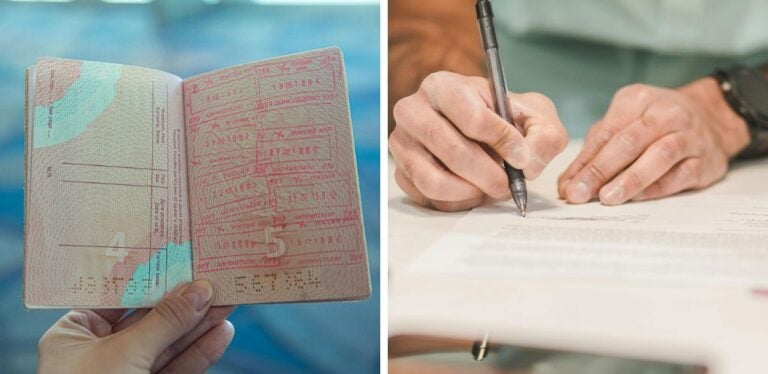Discover the travel requirements to UK from Spain
We analyze all travel requirements to the UK from Spain in 2025. As well as tips to improve your experience at your destination!
As you probably know, travel requirements to the UK from Spain isn’t as straightforward as it used to be since Brexit took effect. You might have heard of people who had been living there but were refused entry after a holiday abroad, or tourists who had to turn back because they didn’t bring a passport. These situations aren’t just rumors—they still happen today because many travelers assume the rules haven’t changed and don’t prepare the necessary documents. What used to be a quick and simple process can now be much more complicated.
To make sure you don’t end up in the same situation as those Spaniards who were turned away at the UK border, we’ve put together a handy guide with everything you need to know before you go. We’ll cover the essential documents you need to bring, the visas required depending on your type of trip, and the immigration checks you’ll have to go through. We’ll also share some useful tips to help you arrive fully prepared and ready to enjoy your time there. Take note and avoid any last-minute surprises. Let’s get started!
Some advice before traveling to the United Kingdom
Before we dive into the travel requirements to the UK from Spain, let us share a tip that will make your life much easier once you land. It’s not mandatory, but having a reliable internet connection can save you a lot of hassle. Being able to check directions, manage your bookings, and stay in touch without relying on hotel or café WiFi will make your trip much smoother and more enjoyable.
For a short trip, Holafly’s eSIM for the UK is a hassle-free and budget-friendly choice. With unlimited data, you won’t have to worry about extra charges, and it activates instantly. Simply select the number of days you’ll need, and you’re good to go!
Planning to stay in the UK for a while? In that case, Holafly Connect’s global internet plans are a great option for long-term travelers. You can choose from 10GB, 25GB, or unlimited data, with the flexibility to change or cancel your plan whenever you need. Plus, the 25GB and unlimited options let you share your connection with other devices—perfect if you’re bringing a laptop or tablet.
Both options are quick and easy to set up—even before you leave Spain. That way, you’ll have instant internet access as soon as you land, without any extra hassle.
Important: If you are a frequent traveler and want to stay connected without worrying about expensive roaming or looking for a new SIM at every destination, Holafly’s subscription plans are for you. With a single eSIM, enjoy internet in more than 170 countries for a fixed price and no surprises on your bill. travel without limits and connect easily and securely! 🚀🌍

That said, now let’s move on to the travel requirements to the UK from Spain in 2025.
1. Air fare to the United Kingdom and back to Spain
Did you know that you could be denied entry to the UK if you can’t prove when you’re leaving? They don’t always ask, but if you’re traveling as a tourist or under a visa exemption, it’s not worth the risk. Having a return ticket on hand can save you from a lot of unnecessary questioning at immigration.
This is particularly important if you’re traveling under the visa exemption rules. For visits of up to six months, UK authorities may ask for proof of your return flight or onward travel. If you can’t provide this, you might be asked additional questions or, in some cases, even be denied entry.
If you’re traveling on a work or study visa, showing a return ticket isn’t required, as your stay will be covered by the visa. In these cases, what matters most is proving that you have the correct visa and meet its requirements.
How to make sure you meet this requirement?
- Have your reservation on hand. Having a digital or printed version of your return ticket will avoid delays at immigration control.
- Check the permitted duration of your stay. If you are traveling without a visa, you cannot exceed 6 months. Make sure your return ticket is within the allowed time.
- Consider flexible options. If in doubt about how long you will stay, look for tickets that allow changes without penalty.
2. Tourist, residence or work visas for the UK
As we mentioned earlier, traveling to the UK is more complicated since Brexit. The good news is that for short trips, all you’ll need is your passport. However, depending on the reason for your visit and how long you plan to stay, you may need a specific visa. Here are some of the most common ones:
1. Tourist or business travel (up to 6 months)
As a Spanish citizen, you can visit the UK without a visa for up to six months if you’re traveling for tourism, business, or short-term studies. However, if you plan to stay longer than six months, you won’t be able to enter with just your passport. In that case, you’ll need to apply for a Standard Visitor Visa, which covers longer stays for tourism, business, or medical purposes.
2. Student visas
If you plan to study at a British institution for more than 6 months, you need a UK Student Visa. To apply, you must:
- Be accepted into an accredited course.
- Prove that you have sufficient funds to pay your tuition and living expenses.
- Have an adequate level of English.
3. Work and residence visas
Planning to work in the UK? Then you’ll definitely need a visa. Since Brexit, you can’t just move and start job hunting like before. The process is now stricter, and you’ll need a job offer in hand before you can apply for a visa.
- Skilled Worker Visa: For qualified professionals with a job offer in the country.
- Global Talent Visa: For individuals with exceptional skills in areas such as technology, research or culture.
- Health and Care Worker Visa: For medical and nursing staff employed in the NHS or health care organizations.
If you’re looking to move to the UK permanently, your options are more restricted and will depend on things like family connections or investment in the country. In this case, you might consider the Family Visa or the Investor Visa, though both have strict requirements.
Whatever your case, applying for the right visa in advance will avoid problems when traveling and guarantee you a smooth entry to the UK.

3. Spanish passport: compulsory to enter the United Kingdom
As we said, you can no longer enter the UK with just your ID card. From October 2021, it is compulsory to present a valid passport, no exceptions.
Make sure your passport is:
- Biometric. Spain has been issuing this type of passport for years, so you should have no problems.
- Valid for the duration of your stay. Although the UK does not require a minimum validity of additional months, it is better to travel with a margin of validity to avoid setbacks.
Don’t have a passport or need to renew it? Simply make an appointment at your nearest police station. The process is quick and costs around 30 euros (£25) (which you pay right there while they handle it).
4. Address of the place of accommodation in the United Kingdom
At immigration, you may be asked for the exact address of where you’ll be staying. Simply saying “I’m going to London” won’t be enough—you’ll need to provide a complete address. It can be a hotel, an Airbnb, a co-living space, or even a friend’s place.
If you change your accommodation during your trip, make sure to keep a list of all the addresses to avoid any confusion. And if you’re staying at someone’s house, it’s a good idea to have them write you an invitation letter.
5. Pass British immigration control
Excellent! You already have your passport, your ticket and proof of accommodation. But what next?
Unlike other countries, the UK doesn’t have fast-track immigration checks. In fact, if you don’t have the proper documentation or fail to answer the immigration officer’s questions correctly, you could be held for further questioning or denied entry.
To get through immigration smoothly, make sure you have all the required documents: a valid passport, proof of departure, and, if needed, a valid visa. Having these ready and in order will make the process much quicker.
You will be questioned. Don’t be surprised if the immigration officer asks you to explain in detail:
- How long you plan to stay?
- Where will you be staying?
- Do you have enough money for your stay?
Please answer confidently and without hesitation. If you raise concerns, you may be asked for more documents or a more detailed interview.
6. Do you need an ETA to travel to the United Kingdom?
From April 2025 onwards, if you’re traveling to the UK for tourism or business for less than six months, you’ll need to get an Electronic Travel Authorization (ETA) before you fly. Without it, you won’t be allowed to board your flight.
The ETA is a new travel authorization system that the UK government will introduce for citizens of visa-exempt countries, such as Spain. It’s designed to register travelers before they arrive and enhance immigration checks.
What you should know before applying:
- It is mandatory for those traveling for tourism, business or short-term visits.
- It is not a substitute for a visa. If you are traveling for work or study for more than six months, you will still need a visa.
- It can be obtained online and costs £10.
- It is valid for two years or until your passport expires, whichever comes first.
- It allows you multiple entries to the UK within the validity period.
If you arrive at the airport without an approved ETA, you won’t be able to board your flight. The UK doesn’t allow you to apply for it last minute or at the border, so make sure to complete the process before you travel.

7. Medical insurance when traveling to the United Kingdom
One thing that has changed since Brexit is access to healthcare in the UK. While the European Health Insurance Card used to cover you in most cases, it’s not that simple anymore.
Nowadays, if you need medical care while in the UK, you could find yourself paying for consultations or treatments, particularly at private clinics. A basic check-up can cost over £100, and hospitalization can quickly reach thousands.
Is travel insurance for foreigners required to enter the UK? No, but traveling without one is not a great idea. A good insurance plan will protect you in case of an accident, illness, or any unexpected situations that might arise.
What should a good health insurance policy include?
- Comprehensive medical coverage, better if it covers at least 100,000 euros (£84,000) in assistance.
- Emergency care, including hospitalization and repatriation if necessary.
- Coverage for unforeseen events, such as loss of luggage or trip cancellations.
Other tips when traveling to the United Kingdom
That covers all the requirements for traveling to the UK from Spain. However, there are a few details that, while not mandatory, can make your experience much smoother. These are things that will make your life easier and are worth considering before you pack. So, what else should you know before you land?
1. Travel insurance for United Kingdom
As we mentioned earlier, health insurance isn’t a requirement to enter the UK, but traveling without it could end up being very expensive. This is especially true if you need treatment at a private facility or run into any issues during your trip.
What are the advantages of taking out travel insurance?
- Comprehensive medical coverage: Good insurance includes health care, hospitalization and repatriation if necessary.
- Protection against unforeseen events: Flight delays, lost luggage, cancellations… A travel insurance supports you at every stage of your adventure.
- 24/7 assistance: Should any problem arise, you will be attended to in your own language anywhere in the country.
2. Driving license in United Kingdom
Planning to rent a car to explore the country? Or maybe you’re staying for a while and need a vehicle to get around? If so, you’re probably wondering if your Spanish driving license is valid in the UK.
For short trips, your Spanish license will be enough to drive. However, some car rental companies may require an International Driving Permit (IDP), particularly if your license is older or if you plan to travel outside the main cities.
If you’re staying for over 12 months, you’ll need to swap your Spanish license for a UK one. The process is simple and handled by the Driver and Vehicle Licensing Agency (DVLA). However, if you’re only staying temporarily, it’s best to check with the rental company to see if you need any extra paperwork before picking up the car.
3. Recommended vaccinations when traveling to the United Kingdom

There are no mandatory vaccines for traveling to the UK, but it’s advisable to keep your essential vaccinations up to date, like the MMR, flu, and tetanus shots, especially if you’ll be in contact with many people. While it’s not required for entry, it can help prevent any health issues during your trip.
Experts advise you to check these vaccinations before traveling if you are going to move around crowded areas, do outdoor activities or stay for a long period of time:
- Triple viral (measles, mumps and rubella): Recommended if you are traveling with children or will be in crowded places.
- Tetanus and diphtheria: Essential if you plan to hike, explore rural areas or engage in outdoor activities.
- Influenza: Advisable if you are traveling in autumn or winter, when flu is more frequent.
- Hepatitis A and B: Especially useful if your stay will be long or you will have close contact with many people at work or at the university.
Although it’s not required to show a vaccination certificate to enter the UK, having your international vaccination record with you can be helpful if you need medical care. It’s always better to be safe than sorry.
4. Cards, cash and payment options in the United Kingdom
If you’re visiting the UK for the first time, you might be wondering if you need to carry cash in pounds or if you can rely on cards for everything. While the UK is well-equipped for digital payments, there are still times when having some cash can come in handy.
In most places, you can pay with a card without any issues. Shops, restaurants, public transport, and even markets generally accept contactless payments with Visa and Mastercard. However, some small businesses, traditional pubs, and certain taxis only take cash. Carrying between £50 and £100 can come in handy if you run into one of these situations.
Before you travel, it’s a good idea to check with your bank if your card has any foreign transaction fees. Some banks charge extra for purchases in pounds, which can increase your travel expenses. Bringing an additional card with no fees, like Revolut, N26, or Wise, is a great option for paying in pounds without extra charges and can help avoid any unexpected holds on your regular bank account. Also, if your card offers contactless payments, make sure you activate it, as this is the most common payment method in the UK.
If you’re planning to study or work in the UK, opening a local bank account will make everyday transactions easier and allow you to receive payments without paying international transfer fees. Many banks offer options for foreigners, even if you don’t have permanent residency. Monzo, Starling Bank, and HSBC are some of the most popular choices among expats and international students.
5. Proof of funds required to travel to the United Kingdom
Lastly, while it’s not a mandatory requirement for all travelers, UK authorities may ask you to prove that you have enough funds to cover your stay. This doesn’t happen to everyone, but if you’re visiting without a visa and planning to stay for the full six-month limit, you might be asked for financial proof at border control.
There’s no set amount, but you’ll need to show that you can cover your accommodation, food, and transport expenses during your stay. As a general guideline, if you don’t have prepaid hotel bookings or free accommodation, it’s estimated that you should have at least £1,000 for each month you plan to stay.
To avoid problems, please bring with you:
- Recent bank statement: Showing sufficient funds.
- Valid credit or debit cards: Preferably more than one.
- Proof of scholarship to study in the UK if you have one.
- Proof of accommodation or letter of invitation: In case you are not going to spend on accommodation.
- Return ticket: Proof that you do not plan to stay indefinitely.
They won’t always ask for it, but if the question comes up at border control, having these documents ready can make the difference between a smooth entry and a lengthy interview.
Frequently asked questions about travel requirements to the UK from Spain
If you’re a Spanish citizen visiting for tourism, business, or short-term studies (up to six months), you don’t need a visa. However, border officials may ask for proof of your trip, like hotel reservations, a return ticket, or evidence that you have enough funds for your stay. If you’re planning a longer stay, you’ll need to apply for the appropriate visa based on your reason for traveling.
Spanish citizens can stay in the UK for up to six months without a visa, as long as the visit is for tourism, business, or short-term studies. However, if you plan to stay longer or work, you’ll need to apply for the appropriate visa before traveling.
It’s not a mandatory requirement to enter the UK, but it’s highly recommended. Since Brexit, the European Health Insurance Card no longer covers all medical expenses, and even a basic doctor’s visit can cost over £100. To avoid unexpected costs in case of an emergency, it’s best to have travel insurance that includes medical assistance and repatriation.
Yes, in certain situations, immigration officers may ask for proof that you can financially support yourself during your stay in the UK. While it’s not always required, if the immigration officers have any concerns about your trip, they might ask you for a recent bank statement or a valid credit card to ensure you have sufficient funds.
If you’re staying in the UK for less than 12 months, you can drive with your Spanish license without any issues. However, some car rental companies might require an International Driving Permit (IDP), especially if you plan to drive outside major cities. If you’re staying for more than a year, you’ll need to exchange your Spanish license for a UK one.
No, there are no mandatory vaccinations for Spanish travelers. However, it’s a good idea to stay up-to-date with basic vaccines, like the MMR, tetanus, and flu shots, particularly if you’ll be in close contact with others or traveling during the winter months.





 Language
Language 


















 No results found
No results found



